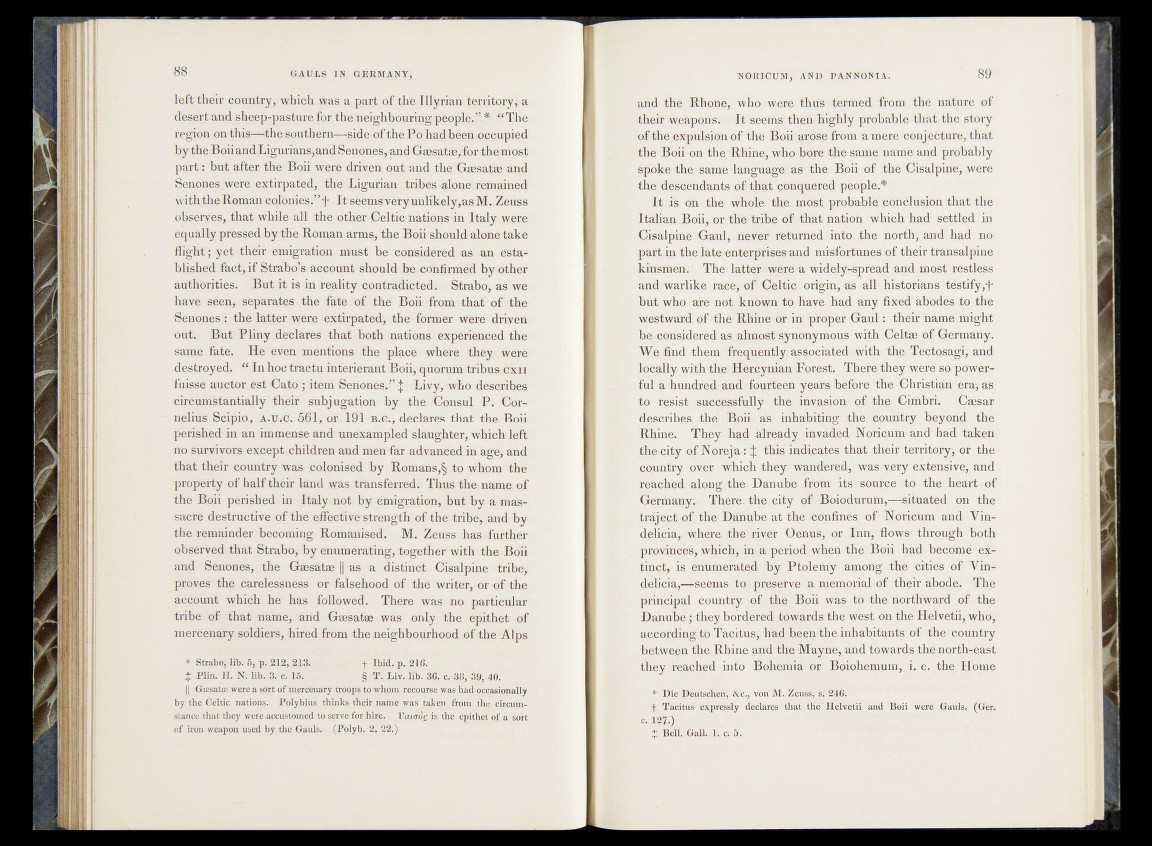
left their country, which was a p art‘of the Illyrian territory, a
desert and sheep-pasture for the neighbouring people. ” * “ The
region on this—the southern—side ofthe Po had been occupied
by the Boiiand Ligurians,and Senones, and Gaesatae, for the most
p art: but after the Boii were driven out and the Gaesatae and
Senonesjwere extirpated, the Ligurian tribes alone remained
with the Roman colonies.” T I t seems very unlikely,as M. Zeuss
observes, that while tall the other Celtic nations in Italy were
equally pressed by the Roman arms, the Boii should alone take
flight; yet their emigration must be considered as an established
fact, if Strabo’s account should be confirmed by other
authorities. But it is in reality contradicted. Strabo, as we
have seen, separates the fate of the Boii from that of the
Senones: the latter were extirpated, the former were driven
out. But Pliny declares that both nations experienced the
same fate. He even mentions .the place where: they were
destroyed. “ In hoc tractu interierant Boii, quorum tribus cxii
fuisse auctor est C a to ; item Senones.” | Livy, who describes
circumstantially their subjugation by the .Consul P. Cornelius
Scipio, a.u.c. 561, or 191 b.u., declares that the Boii
perished in an immense and unexampled slaughter, which left
no survivors except children and men far advanced in age, and
that their country was colonised by Romans>§ to whom the
property of half their land was transferred. Thus the name of
the Boii perished in Italy not by emigration^ but by a massacre
destructive of the effective strength of the tribe, arid by
the remainder becoming Romanised. M. Zeuss ha^ further
observed That Strabo, by enumerating, together with the Boii
and Senones, the Gaesatae [| as a distinct Cisalpine tribe,
proves the carelessness or falsehood of the writer, or of the
account which he has followed. There was no particular
tribe of that name, and Gaesatae was only the epithet of
mercenary soldiers, hired from the neighbourhood of the Alps
* Strabo, lib. 5, p. 212, 213. „ f Ibid. p. 216.
% jPBri.. H . NTllb. 3.: c. f § T . Liy.”Iib. 36» c. 33, 39, 40.
j| GessaXee were a sort of mercenary troops tp whom .recourse was had occasionally
by the Celtic nations. Polybius thinks their name was tajten from the circumstance
that they were accustomed to serve for hire, t'cuapg is the epithet of a sort
of iron weapon used by the Gauls. .(I’plyb. 2. 22,}/
and the Rhone, who were thus termed from the nature of
their weapons/.. | It seefm^then highly probable that the story
of the expulsion of the Boii arose from a mere* conjecture, that
the Boihbn the Rhine, who bore the same'name and probably
spoke the >same language a s'th e Boii of the Cisalpine, were
the .descendants of that cbpqu£red.flp©ple.#
It is on the whole the rnp&t probable conclusion that the
Italian Boii, orthlj^tribQ pf that nation which had settled ip
Cisalpine ,Gaul, never* returned into the north, and had n°
part in the late .enterprises and misfortunes, of jt-hgir transalpine
kinsmen. The latteri were a’ widely-spread and most^festless
and warlike race»f Celtib? < orfglUr as all, historians^festify,T
but who are not > known to have had any fixed'abodes* to the
westward of ythe Rhine or in prbper Gaul:' their name might"
b^^b.fsidered almost synonymous with Qkltaa (of Germany. -
We find them frequently associated wlth^the ’MeGtlsaWip and
lgcally with tkp?TlercyniauJ^rujlt.' /There they were so^power-
ful a 'hundred^ahd^fourfeen'yearahiiibi'pithe^ChKfstiun t^a,as
to §res-i s*t,T speeds fully f,*^he iny^jon*;of. the^Cimbri. Caesar
describes the "Boii- as* inhabitiigi the' couritry^beyond the
Rhine. They had already invaded; MpCum utf<d had* faked
the city ofM^rej%.f1Wthi|S4 indicates that’ their territory, or the
country quwer- whicp^]they .wandered', was* yer#^Stpnsiye7 and
reached alopg<;the Danube,faf&n,' i>ter,SouyceMto thedfeeart of
Germany. There the citjg of* B o io d u rum ^ ^ itu® d j?oii‘ the
traject ©f,,the Danubej,at.fche .Gonfinbs*; of' *N ©ri cute * ahd Vin^
delMi^ where the «river Oenus, or Inn, flow^|th%p#gh both
proyiuc^ss,’which, in a period wh^^h'eiBoii had beeome ex-
tipcf, is enumerate«!*1 by Ptolemy umong^the,!tcrriiC|^^^Vin-
delicia,—seems« to preierye a memorial bif, their afej ^ M Thd
principal country of the Boii wasOtq the northward of the
Danube; they bordeyed^towards the%eskiopt'W'e Helvetii, whip
according to Tacitus, had been the inhabitants« of] the/uottntry
between the Rhine and the Mayne, and towards thfenorth-.eas‘t
they reached into Bohemiuspr Boiohemum, i._e. the Huaiu
* Die DeutscKen, Slc!, VorTM.Zfeussflf2‘46. '
Tacitus expressly declares mat the Helvetii and Boii were Gauls. (Ger.
c. 127») •
X Bell. Gall. li e. &